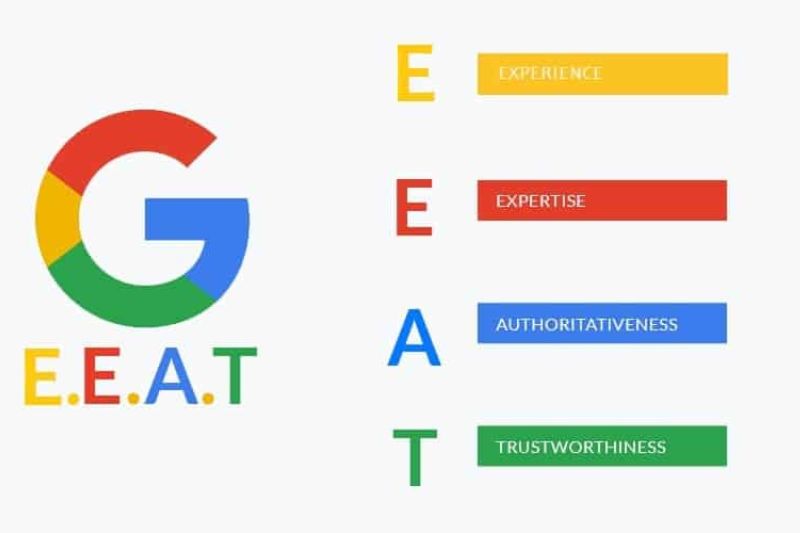
Begoña Ontiveros
SEO & Content Writer
If there is a supreme guideline in Google, it is that we make the best content for the user. And the addition of a new acronym to the EAT, now EEAT, adds a new nuance to take into account for the SEO of your website.
In 2014, the first mention was made of EAT, which stands for Expertise, Authoritativeness, Trustworthiness (Expertise, Authority and Trustworthiness) in Google’s quality guidelines. And at the end of 2022 they have updated them, including a new E, for Expertise.
But… where does this EEAT come from?
índice
Although we were talking about 2014, it is not really until 2018 that we started talking about EAT in the SEO world. Google explains: “After identifying relevant content, our systems try to prioritise the content that is most useful. To do this, they identify a set of factors that can help to determine which content demonstrates expertise, authoritativeness and trustworthiness”.
With this new update, Google is making its message even clearer. Content that is useful, made for people, and solves the search intent.
And although it is not a ranking factor, it is clear that Google will give more importance to content that is related to EEAT. Especially on topics that have to do with money, or life, the acronym YMYL.

Because not only the algorithm evaluates the content, but also quality raters do so following very strict standards. And one of these is going to be the EEAT.
Therefore, it is necessary to take it into account for content generation. If it is accurate, trustworthy, and relevant, there will be no concerns. It will be liked by the algorithm, the raters, and most importantly, the target audience.
The “E” in “Experience”
The first “E” of EEAT refers to the experience of the person writing the content. It considers whether the author has the necessary expertise to discuss the topic at hand.

It may seem obvious, but the truth is that until now, Google could consider, for example, a review written by an author who had not actually tried the product as equally valid as a review from someone who had.
With the addition of this letter, we all benefit. Because what do you prefer? Reading a review written by an author who has actually tested the product, or by someone who hasn’t? The answer is clear.
The same applies when it comes to health topics. Here, EEAT plays an important role. Google is very strict in its content policies regarding this matter.
The experience of the person writing content related to this topic is vital. They will have to meet the user’s search intent, who is seeking the answer from a professional. And they will have to provide full assurance to that person by delivering accurate content.
For us, as users, it will be very useful to know the first-hand personal experience of those who have tried a product, gone through a banking process, or undergone a surgery. This type of information shows the writer’s experience with a high dose of reality.
This “E” gains even greater importance with Google’s latest update, the Product Reviews Update. Product reviews, e-commerce sites, and affiliate recommendation websites are being affected by the algorithm change.
This modification seeks originality. Genuine “experts” should have actually tried the product and not rely on reviews from others or existing information on the internet.
But what about SEO? Is it the end? Will our content stop ranking? Not at all, because if we write original and useful content for the user, we will continue to rank.
And don’t worry, you can still rely on ChatGPT to improve your website’s SEO. It will be a great companion, but undoubtedly, the important thing is for your content to fulfill the user’s search intent.
The other “E” is for Expertise
In Spanish-speaking countries, we might confuse this “E” with “experience,” but the translation of this “E” would be more related to knowledge or expertise.

To provide a clear example that differentiates experience from expertise, the two “E”s of EEAT, let’s consider health topics.
In this case, if we want to gather information about certain types of medical treatments available today, we would turn to medical experts (Expertise). However, we should not overlook the personal experiences shared by patients who have undergone the treatment (Experience).
In terms of SEO, Expertise lends credibility to a website in terms of the quality of its content. An anonymous article will not carry the same value as one written by a professional with over 20 years of experience in the field.
These types of profiles are industry professionals who possess extensive knowledge about the subject they write about and are recognized within their sector. This generates trust, which is not only beneficial for the algorithm but also directly benefits the user consuming that content.
“A” for Authoritativeness

In this section, we refer to the reputation of the website, and within reputation, there are several aspects to consider:
- Backlinks: The more incoming links we have, especially from websites in the same topic or industry, the more authority will be transferred.
- Brand searches: When users search for a specific brand name, it is a clear signal that they are interested in the content of that website. It increases the search engines’ trust in the website and improves its ranking in search results.
- Brand mentions: Not only searches on Google, but also simple mentions of the brand, even without a link, are important.
- Presence on social media: Having an active presence on social media can increase the visibility of the website and generate referral traffic. If useful and interesting content is shared on social media, users are more likely to click on the links and visit the website.
This can increase the page’s authority as search engines detect higher referral traffic and engagement on the site.
Furthermore, social media can provide social signals that search engines use to assess the relevance and quality of content. If a website has an active presence on social media and users are sharing, commenting, and interacting with its content, it can be a signal that the website is a trusted and valuable source of information.
- Reviews and recommendations: Both on Google Business Profile and other business directories, reviews and citations can increase the authority of the website.
“T” for Trustworthiness

Trustworthiness is the last factor in the EEAT acronym. It indicates the credibility and reliability of the information provided by a website.
It will largely depend on the type of website. For an e-commerce site, for example, ensuring a secure checkout process will be a crucial element of trustworthiness.
In sectors related to health or money (YMYL), such as financial information websites, medical sites, legal information, or official and public sites of importance to the public, trustworthiness is particularly relevant.
In these types of websites, it is important to provide users with information about the content author or the company it belongs to. The goal is to offer transparency and security to the user by being a transparent website.
How to Improve EEAT SEO
If you’re concerned that your SEO efforts may be at risk because your content doesn’t meet EEAT requirements, don’t worry. Keep in mind that starting with a solid SEO content strategy, your texts will be useful for users and for Google.
Creating high-quality content demonstrates expertise on the subject. It’s important for authors to be recognized experts in the field, and their experience and credentials should be mentioned.
In these cases, it’s recommended to sign the article and include an author bio box.

Include references and sources in your articles through high-quality outbound links, primarily from other reputable websites in the same field. Getting mentions in media outlets can be a big plus.
Reinforce user trust through transparency in site information, including clear and accessible privacy policies, and the inclusion of testimonials and reviews from satisfied customers.
It’s advisable to keep the site updated with fresh and relevant content. Also, regularly update older information to keep it current and accurate. This way, it can be easily seen that your article is up-to-date and revised according to current knowledge.
Encourage interaction with users by including comment sections and active social media channels that allow for direct and close communication.
By following these strategies, you can improve EEAT SEO and increase the relevance and visibility of your website in search engines.


